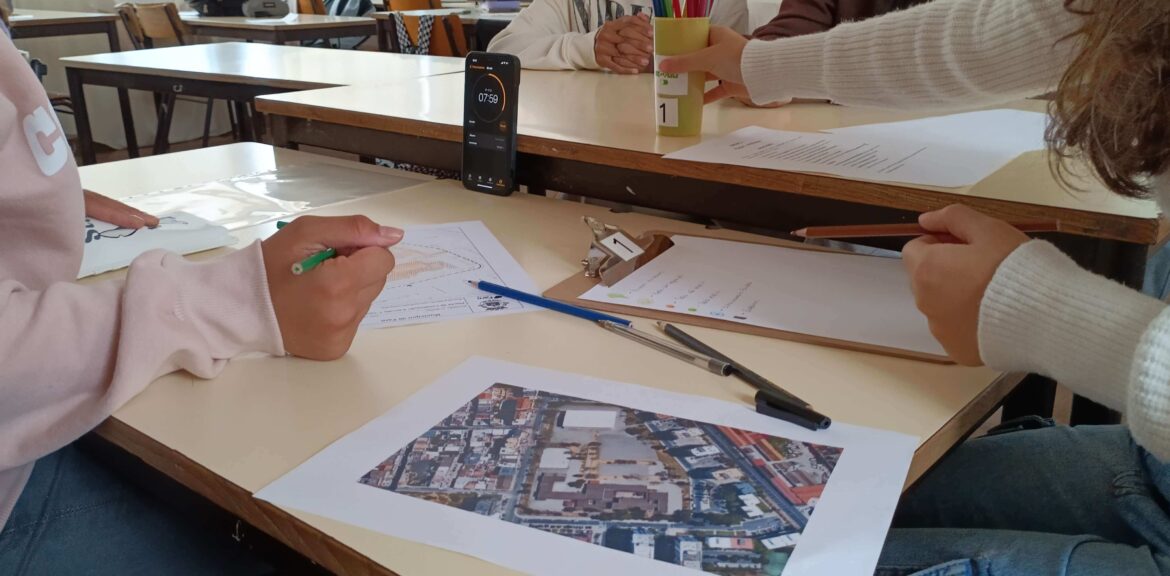In November and December 2024, Faro MC-YOU young multipliers undertook a set of 3 training sessions from the ”Method Box” of the Project ”Resilient Cities” Toolkit: 1) Resilient Cities, 2) Knowing my City, and 3) Minecraft and Defining Project Objectives.
This article briefly presents the main highlights and ouctomes of the experience of application of Session 1) Resilient Cities in Faro, with a special focus on the non-formal education methods used.
Session 1 – Resilient Cities
From breaking the ice, to learning about and exploring the project topics, while having fun!
Icebreaking: Bingo!
A thematic breaking ice game is an effective and fun way to kick-start sessions involving young people (and not only!). In fact, games can serve as an engaging introduction to the session topics, while also giving facilitators valuable information about the participants (e.g., their names, previous awareness and knowledge about the topics, etc.). A twist of the traditional Bingo game, with cards containing different questions, encourage participants to think, interact, share, and learn as they play, and is an excellent way to start a session.
The Bingo Game in Faro included a variety of questions regarding sustainability and resilience habits, and other project related topics (e.g., youth participation, minecraft) that were adopted to the group profile and context: ”Has participated in a Cleanup Action”, ”Reduces water consumption or reuses water”, ”Rides a bicycle”, ”Has participated in the School’s Participatory Budget”, ”Plays Minecraft”, etc.
When everyone was ready, the prompt was given – ”Find someone in this room that”… – and everyone rushed! By the end of the game, participants were energized, and initial presentations were made, connected to a variety of reflections and personal experiences regarding the project topics (Maria reuses water, António rides a bycicle, Carolina plays Minecraft, etc.).
Getting to know the project – from global to local
Participants were invited to follow a slideshow and describe what they saw: From Planet Earth…, to Europe…, to Portugal…, to the Algarve Region…, to Faro City…, to their School!! Their enthusiasm, pointing to the images, was contagious! After all, the themes of the MC-YOU Project concern all of our Planet, the project consortium is formed by 8 European Organizations, involving 3 Pilot-Cities, incluiding their own – Faro – and their School; and with the use of images, and other tactics, participants themselves can work together with the facilitators in understanding and explaining the project, and working towards making it their own.
In fact, although this is a very small example, actively engaging and inviting THE Participants to really participate, even in the most informative and ”knowledge transfer” parts of the process, is essencial in a project like MC-YOU where youth participation is not only important, but foundational.
Learning about and exploring the project topics
When explaining conceps, such as Sustainability and Resilience, or others, is important that participants not only ”get to know them”, but really understand them and explore them. Resourses that they may be familiar with already, like the Sustainable Development Goals (SDG), for example, and the inicial reflection and presentation of the definitions of the concepts is important, but is just the beggining.
In small groups, the Faro participants were invited to explore and map environmental aspects and social aspects of their own school – a setting that they are already familiar with, but now being invited to seeing it with the lens of Sustainability and Resilience.
Are there trees in the school? Where? Is the soil paved or permeable? Are practices like composting being used? And solar panels? Is there a bycicle parking? And in terms of acessibility? Is the place acessible for all? Yes? No? What could be improved? What materials are being used? How is the social life of the outdoor place – from doing sports, to chitchatting? And in terms of thermic comfort – are there enough shadows and trees for the Faro hot summer days?
With this activity youngsters were able to recognize, reflect and map different aspects of their own school, and started looking at the places surrounding them with new eyes!
Currenlty, this work is part of the School exhibition that opened the Faro Agora and Consultation phase of the project.
Before closing – Everyone needs feedback
The perception of facilitators, while important, can also be misleading. Was the session sucessful? Was it enjoyable and useful for the participants? For facilitators, the participants feedback is fundamental to evaluate the session and improve future ones; and for the young participants is fundamental that they, indeed, participate and express their opinion since session 1, working towards Laura Lundy’s model of participation (space, voice, audience, influence).
Feedback received – Faro participants stated that what they liked the most in the session was the ”Bingo”, ”drawing”, ”the theme”, ”the challenges”, ”searching for things in the school”, ”understanding the school’s architecture”, ”the teamwork outside the classroom (in the open air)” with some describing it like a ”unique” and ”fun experience”. Regarding what they liked the least and suggestions for improvement, some expressed the expectation of starting using Minecraft (”start with Minecraft right away”, ”play Minecraft earlier”, ”play Minecraft as early as possible”) and gave some suggestions regarding tools – ”Kahoot”, ”Fornite”. A feeback of ”I didn’t like the project with paper and stuff” reminds us that all participants are different, and that not everyone enjoys the same activities and methods.
Municipality of Faro
